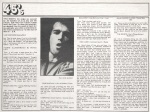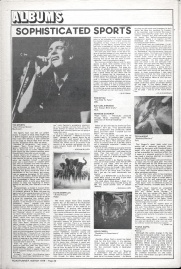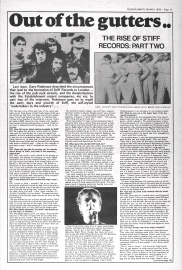Roadrunner, March 1979: Difference between revisions
(formatting) |
(+text part 5) |
||
| Line 84: | Line 84: | ||
We made a list, actually...a very quick list. Micky Jupp was the final person on it and we signed him recently, so we've actually completed our list of signings. It was run on a co-operative basis, like the pub rock thing, and we try to keep that in the record label. People who were doing well co-operated to help people who weren't doing so well — play on their records or give them a song — and it's worked out very well like that. | We made a list, actually...a very quick list. Micky Jupp was the final person on it and we signed him recently, so we've actually completed our list of signings. It was run on a co-operative basis, like the pub rock thing, and we try to keep that in the record label. People who were doing well co-operated to help people who weren't doing so well — play on their records or give them a song — and it's worked out very well like that. | ||
''Where did the idea for putting out the sampler album Bunch of Stiffs, way back in the beginning , come from? | |||
Well, we couldn't really afford to do albums on everybody. We started the company on about $600 Australian and as in the record business, you don't get your money until about three months after you've earned it. We still didn't have much. The ''Bunch of Stiffs'' was to show people the kind of thing we were into. To put out a sampler that would attract attention. I'm not into samplers or compilation albums that much, but I think it explains some of the different styles that you're involved in. Some of the singles which were on it had sold quite well compared to what normally happens to singles that weren't on radio. | |||
''It was almost Stiff that revived the single, wasn't it? | |||
I think so. Well, I wouldn't like to say that we revived the single but I think we had a bit to do with it in that we started a lot of groups who up until then had been jamming and doing long, involved things and we came along and said: "Look, three minutes... 2½ minutes if possible. Let's be sharp." The speed we were working on was that the single was the art form for that kind of thing. | |||
We also wanted to turn a record around quickly. We'd hear the song, record the record the following day and have it out by the end of the week. We'd find little pressing plants that were prepared to press them quickly. So the whole style of it lent itself to the singles track. | |||
''What about contracts? You didn't sign people up for five years, or whatever...? | |||
We signed them up for one single. That was the basis for it. We said: "If it goes well for you after that, we'll talk to you further." Now this was the direct opposite of the big companies where people are signed up for a long period, go off them but don't tell them and don't do anything with them but still retain them because maybe they're going to happen. | |||
You see, the big record companies did work on the principle that maybe they're going to happen. They weren't prepared to make it happen or at least happen up to a par with how good it was. So you have a single that is quite good and you try and sell it "quite good". You try to promote that band at least up to a par with the record. I believe it's "in the grooves" somewhat. A record can only go so far. It s very hard, though. A lot of tracks that I haven't liked, people in America have really loved and you've got to reach as big an audience as you can because they might like it. | |||
There were a few tracks that I didn't think were much cop but I liked the people involved. Like Larry Wallis' "Police Car." I though it could've been done quite a lot better but people in America loved it and a couple of stations on the East Coast programmed it quite heavily and we sold quite a few of that single. | |||
We started to export singles. Up until then, exports had been totally in albums. People weren't very interested in the single — it was too costly to import and then suddenly it became "I need THAT single". That was the other thing that punk music did. | |||
There was a belief in major record companies that if someone went into a record shop and wanted a Patti Smith album and they couldn't get it then they might buy an Eagles album. Now the New Wave proved that people go in with a very firm idea of what they want. They were prepared to go to five or six record shops to find that one record that they wanted. Suddenly you had an audience who knew what they wanted. The "business music" was starting not to sell and it worried the big companies and we were very cocky. We were jumping round and shouting all the time. | |||
''What about the ads that Stiff took out? | |||
We said that our ads must mirror and attract attention to the artist. We do up our ads so that people say: "This is an interesting ad" — even if you don't like the record, it gives you an idea what the artist is like. Before that people were taking pages in music papers purely because the manager of the group hustled a bit. But nobody was applying themselves. The art department of a major record company were bozos. They were going "Ooooh, I've always wanted to use this lettering so I'll do the title with that." There was no relationship to what it was. Now pop music and punk rock became a total form where the ad, what people said in their interviews, the whole style was total. They believed in it totally. | |||
You were looking for ads that were provocative in the same way that the music was and the same way they looked on stage and the whole thing tied together in that way. Now a lot of big companies in Britain have started to rip off those ideas, and that's good. The newspapers loved it because people are buying more and more advertising than they used to. | |||
These things rarely come from a major record label. Polydor in England are doing very well at the moment because they've got a big disco RSO catalogue (''Saturday Night Fever'', ''Grease'', Bee Gees, etc) and they've also got Sham 69 and Siouxsie and The Banshees who you d say were straightforward punk. | |||
I feel that there is always a time for things. I think "Stiff had its time. There was a time which was right for Stiff to launch itself and it did a lot of the work by itself. The musicians and everybody who was involved in it were talking about Stiff. Island Records and Virgin Records have had that kind of timing and style and put it across at the time and what is hard is to keep it up. I think that Stiff Records will stop at some time. It's got a built-in point where it just explodes just like lots of those bands. Where you put out 18 albums one month or something and the whole thing goes up. I look forward to it because I don't think lifelong careers in one company or one situation apply. | |||
''What do you see as the major fault of the big record companies? | |||
The attitude by the companies that if the record doesn't sell they they say that the group can't be much good — which is bullshit. The record company s job is to sell the record. It's not to stand in judgement of the record but once they've decided that the group is good and worthy, they should encourage that band and then sell the record. That their job. That's what they're supposed to be good at and mostly what they're good at is whineing about the group and their management — that's what they mostly do. | |||
If you think about it, very few big record companies have broken any new bands lately. They buy them. There was a time when all the major companies were going out and offering hundreds of thousands of pounds to little punk bands who'd just got off the dole. Then when it didn't happen they couldn't understand it. | |||
It's like the Mersey boom back in the 60s. The Beatles couldn't get a record deal even though they went around all the companies — even George Martin wasn't that interested at first. But as soon as it happened, every record company was up to Liverpool signing everything that walked around with a guitar. In the punk era it was the same. Anyone who looked like a punk and played, they signed. They didn't know what it was. Is this good punk music or is it bad punk music? I don't know — so let's sign it up. We'll give them some money but there'll be options in there so we can get out if it doesn't work. It wasn't as if they thought it was important because the music business unfortunately takes — it doesn't give a great deal. It doesn't instigate things except in the rare case. It's a business. A greedy accountant's business. | |||
It's also a huge business. It's repulsive that one of the few pleasures that we have in this world and it's a luxury — it's not really an essential — it's repulsive that a bit more effort and time and creative talent isn't brought to bear on the bloody stuff. | |||
''How did you come to be involved with the music from Akron? | |||
Well, Devo sent me a record which was Mongoloid and Joko Homo. Now we were getting maybe 50 tapes a week and it was getting very difficult to pick and choose out of that number. So one day you put them all on and say "yes, no, yes, no" and you make quick decisions. Also someone might have eight numbers on a tape and the last one might be the greatest thing you've every heard but if he hasn't got the klutz to put in on first then you ain't gonna hear it probably. So you're looking for somebody who not only can write but also has a bit of brain power behind what he does. | |||
The Devo record looked so interesting that I wrote back to them and said that I'd be very interested. I went out to Akron in December 77 in the middle of a blizzard and nearly froze to death and signed up Devo for three singles. | |||
''Did they already have those singles recorded? | |||
Yeah. They had them made and I heard the tapes. They were also receiving some offer from Warner Brothers which was OK because I didn't want to be tied up with them forever because they were our first attempt and at American band and I'm a bit wary of Americans in general. Their attitudes and philosophies somewhat differ to British people. I don't know which is better but... | |||
While I was in Akron, I just found all these bands. They all just seemed to come around and they knew about Stiff which was very flattering because this was Akron, Ohio, which is about as far from anywhere as you can get. It's got absolutely nothing going for it. It's the "rubber capital of the world." It's got no gigs and all these bands had four-track Teacs in their | |||
| Line 91: | Line 145: | ||
{{cx}} | {{cx}} | ||
{{rttc}} | {{rttc}} | ||
{{cx}} | {{cx}} | ||
Revision as of 00:18, 23 June 2017
|





